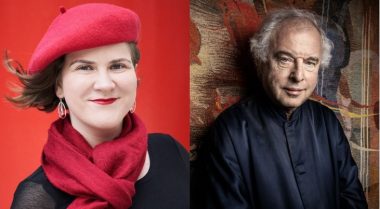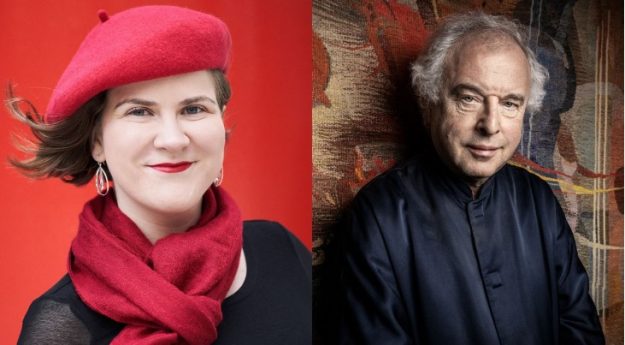 United Kingdom Haydn, Mozart, Schubert, Dvořák, Schumann: Ema Nikolovska (mezzo-soprano), Sir Andras Schiff (piano, fortepiano). Wigmore Hall, London, 8.6.2024. (AK)
United Kingdom Haydn, Mozart, Schubert, Dvořák, Schumann: Ema Nikolovska (mezzo-soprano), Sir Andras Schiff (piano, fortepiano). Wigmore Hall, London, 8.6.2024. (AK)

Haydn – She never told her love (1794-5); Fidelity (1794); Sailor’s Song (1794-5)
Mozart – Komm, liebe Zither, K351 (1780-1); Als Luise die Briefe, K520 (1787); Abendempfindung, K523 (1787)
Schubert – Leichenfantasie, D7 (c.1811)
Dvořák – V národnim tónu, Op.73 (1886)
R. Schumann – Leiderkreis, Op.39 (1840)
Interestingly, Sir Andras Schiff opted to use Wigmore Hall’s splendid fortepiano for the first half of the concert and its also splendid Steinway for after the interval. Wigmore Hall’s fortepiano is a copy, made by Paul McNulty, of Viennese Conrad Graf’s c.1819 instrument. Graf was an instrument maker for the imperial court but, as Beethoven liked Graf’s instruments, in 1825 he also provided a pianoforte to Beethoven.
It was interesting to hear Viennese composers Haydn, Mozart and Schubert on the Graf copy. All the songs performed were composed before 1819 but Graf was making fortepianos two decades earlier and opened his shop in 1804. Haydn and Schubert might have been familiar with Graf’s instruments, but Mozart missed out as he died in 1791.
The light action on the fortepiano makes it difficult to have full dynamic and articulation control. However, Schiff’s accuracy, transparency of polyphonic lines and cantilena playing made look performing on the Graf copy as child’s play. Furthermore, Schiff managed to sound symphonic, even operatic in the early Schubert Fantasy, no mean achievement on a fortepiano.
Wigmore Hall’s technical knowhow is most impressive. They moved out the Graf fortepiano copy and brought in their modern Steinway piano within a fraction of the interval. I left the hall only for a few minutes but I missed the change altogether.
Anecdotally, Robert and Clara Schumann held Graf pianos in high esteem. Accordingly, Roberts’s Liederkreis (composed in 1840) could have been tackled on the fortepiano. However, although we were not told why both fortepiano and piano were used at this concert – the programme notes dealt only with the songs, not with the instruments – there must have been musical/scholarly reasons for this choice.
Interestingly, the concert concluded with three encores: one song for solo voice and two Schubert songs for voice and piano. Schiff’s playing the two Schubert songs on the Steinway piano was utterly beautiful. In addition, Schiff played the piano part in ‘Auf dem Wasser zu Singen’ from memory; the Steinway piano under his hands sounded like the shimmering surface of water in glorious free nature. Would it have sounded similarly on the fortepiano?
Macedonian-Canadian mezzo-soprano Ema Nikolovska, a BBC New Generation Artist 2019-22, is a young but accomplished artist. Her programme was well put together, giving a good spectrum of classical repertoire while also including lesser-known works. The English Haydn songs and the very early Schubert Leichenfantasie are likely to have been new to many of the audience as they were to me.
Nikolovska performed all songs from memory, all in original language. She clearly fully understood and thus presented all emotions within the text/music with dramatic flair but, at the same time, with disciplined style of the period. There were some appropriate operatic gestures while dynamics as well as tone colours were plentiful and delivered with care. However, for my ears, Nikolovska’s pitching stood in the way of perfection. It is possible that the different tuning of the two instruments – the fortepiano was tuned lower than A=440 and the Steinway piano very slightly above A=440 – caused problems for her but, in my opinion, relative pitching should not be disturbed by such differences.
Nikolovska is a great communicator within the performance but also off-performance. She talked to the audience from the stage with ease, flair, and plenty of humour. Unfortunately, she spoke without a microphone: I had a wonderful seat halfway through the hall and heard about half of what she said in her lengthy verbal communication. It is possible that people behind me heard less although, judging by audience responses, a fair portion did hear everything clearly.
Nikolovska spoke with utmost respect about Sir Andras Schiff, and her appreciation for her top pianist partner was evident throughout. Schiff, in turn, gave his full musical support and was encouraging without being patronising. His request for a Macedonian solo song for one of the encores was a very nice and very welcome gesture, especially as Nikolovska sang it so beautifully. Do I think that there was natural chemistry between the two artists? I am not sure, but their professionalism produced an artistic event of top quality to cherish.
Agnes Kory
